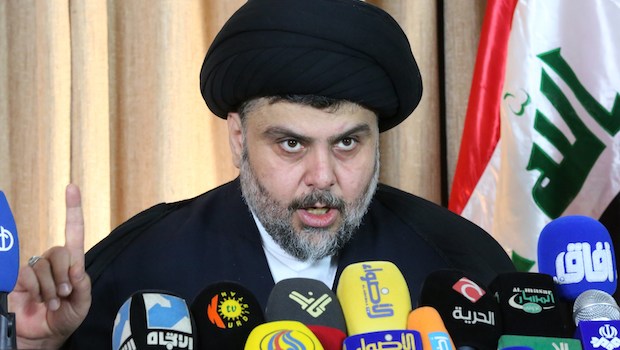
Iraqi Shi’ite cleric Moqtada Al-Sadr delivers a speech from the southern Iraqi city of Najaf on February 18, 2014. (AFP PHOTO/Haidar Hamdani)
Baghdad, Asharq Al-Awsat—In his second media appearance since he announced his intention to quit politics, Iraqi Shi’ite leader Moqtada Al-Sadr called on the people of Iraq to participate in the forthcoming parliamentary elections to prevent “thieves” and “beneficiaries” from gaining power.
Sadr has been an increasingly fierce critic of embattled Iraqi Prime Minister Nuri Al-Maliki, denouncing him earlier this month as a “dictator and a tyrant.” He has called for a series of anti-government protests each Monday, saying the Iraqi electorate should ignore “the negligence and disregard of some politicians” and participate in the forthcoming legislative elections, scheduled for April 30.
“If elections are held without the participation of patriotic and loyal voters, the unfit will inevitably make it to power,” Sadr said.
Sadr’s speech on Thursday comes against the backdrop of an escalating political crisis, with a number of prominent Iraqi political figures being excluded from running by the Independent Higher Elections Commission. Some of the excluded candidates have subsequently been reinstated by the Iraqi judiciary, fueling fears of the politicization of the electoral process.
The leader of the Shi’ite National Iraqi Alliance, Ibrahim Al-Jaafari, said in a statement that “Iraq may face strife aimed at destabilizing national ranks and causing disunity among the parties before the elections.”
The National Iraqi Alliance is the leading Shi’ite political bloc in Iraq and includes Prime Minister Nuri Al-Maliki’s own party as well as the Sadrists. Disputes among blocs in that alliance have escalated over the exclusion of some candidates. Ihe coalition is now facing both internal rifts and challenges from other political blocs, including the Sunni-dominated Mutahidoun Coalition and Iyad Allawi’s bloc.
The Democratic Civil Alliance received a blow on Thursday after an arrest warrant was issued against Mithal Al-Alusi, one day after his parliamentary candidacy was reinstated by the judicial commission following an appeal.
Speaking to Asharq Al-Awsat on Wednesday, Alusi hailed the judiciary’s decision to reinstate his candidacy. He said his reinstatement “has demonstrated that some of the decisions of the Independent Higher Elections Commission had political motives.”
The arrest warrant means he cannot run in the parliamentary elections.
